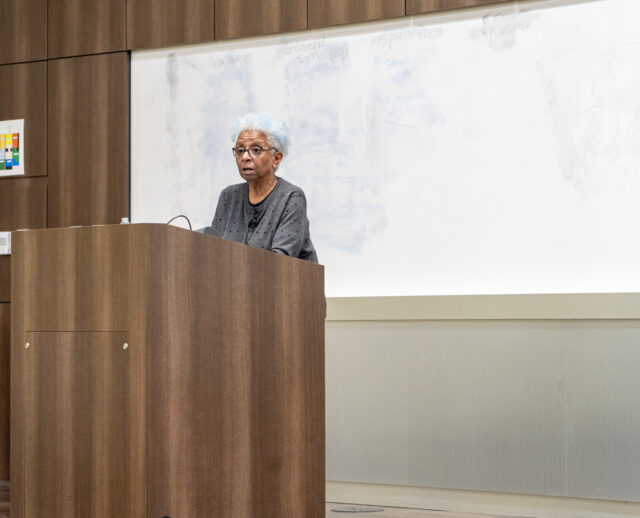By Ashlyn Beck | Staff Writer
Dr. M. Shawn Copeland, professor at Boston College, spoke about the importance of solidarity in the fight against social injustice Tuesday night, based off of W.E.B. DuBois’ short story, “Jesus Christ in Texas.”
Copeland summarized W.E.B. DuBois’s short story and recalled the lynching of Jesse Washington, saying that solidarity is necessary to fight against social injustice in America.
“Solidarity is basically the recognition and realization of humanity of not one’s colony, but that of The Other and all others,” Copeland said.
According to the Boston College website, Copeland specializes in theological and philosophical anthropology, and particularly studies at the intersection of Christianity and racial justice. Copeland said racial justice involves a sense of solidarity between humans, regardless of gender, race or status.
“As much as solidarity involves an attitude or disposition, it entails the recognition of the humanity of the other as human, along with regard for the other in her and his own particularity,” Copeland said.
According to Copeland, solidarity necessitates an openness of character that costs time and energy.
“Solidarity is action and acting with. Action and the acting at the sight of. Solidarity is a [practice], a way of being in the world for God and for others,” Copeland said.
Solidarity is work for the giver, but it is necessary to unite for a common good, Copeland said. Standing in solidarity means taking on the burdens of others who experience more oppression and exploitation, she said.
“Solidarity can never be severed from the self-giving love. Only those who follow the example of a lynched one and struggle on the side of those who are exploited, despised and poor will discover him at their side,” Copeland said.
According to Copeland, humanity is not many people struggling individually, but instead one being struggling toward unity in solidarity and agreement with one another.
“There’s just one race, the human race. And that race is multiple, diverse, varied and concrete, yet one,” Copeland said.
Oppression of marginalized groups is an “assault” on the unity of humanity, and all must stand against it together to make a difference, according to Copeland.
“Human beings are intrinsically, metaphysically, ineluctably connected. Human beings are one. Humanity is just one intelligible reality — multiple, diverse, varied, concrete and one,” Copeland said.
Copeland said people are required to take responsibility for their mistakes in the past and present in order to stand in solidarity with those being marginalized.
“This shouldering of responsibility obliges us in the here and now to stand between those who are poor, despised and exploited and between them and the societal powers of oppression, to do all that we can to end their marginalization, exploitation, abuse and murder,” Copeland said.
According to Copeland, historic lynching is comparable to modern-day racial oppression and the crucifixion of Jesus, and one has to understand the weight of lynchings to understand their relation to the crucifixion and the magnitude of racial oppression today.
“The crucifixion of Jesus of Nazareth was a first-century lynching. And the neo-lynching of unarmed Black youth, women and men in the United States is a modern-day crucifixion,” Copeland said.
Louisville, Ky., sophomore Eliza Denley said she enjoyed hearing Copeland’s perspective on the idea of Jesus as representing all of the marginalized in his death.
“It was a perspective on American history and Christianity I’d never heard of before, and [Copeland] put a lot of things together that I had never put together on my own,” Denley said.
Solidarity is the best tool to fight against social injustice, according to Copeland. Not only racial injustice, but gender inequality, homophobia and transphobia too.
“It’s… the joy of solidarity affirms life even in the face of sin and death,” Copeland said.



